Roof Panel Replacement Sedan
Removal Procedure
- Disable the SIR system. Refer to SIR Disabling and Enabling in SIR.
- Disconnect the negative battery cable. Refer to Battery Negative Cable Disconnection and Connection.
- Remove the windshield garnish moulding. Refer to Windshield Garnish Molding Replacement.
- Remove the inner rear quarter trim. Refer to Quarter Upper Trim Panel Replacement.
- Remove the inner upper centre trim. Refer to Body Hinge Pillar Trim Panel Replacement.
- Remove the overhead lighting panel. Refer to Dome Lamp Replacement.
- Remove the headliner. Refer to Headlining Trim Panel Replacement in Interior Trim.
- Remove the windshield. Refer to Windshield Replacement.
- Remove the rear window. Refer to Rear Window Replacement.
- Remove the roof weld moulding. Refer to Roof Weld Joint Reveal Molding Replacement.
- Visually inspect the damage. Repair as much of the damage as possible.
- Apply tape to the corners of the panels and adjacent surfaces.
- Remove the sealers and anti-corrosion materials from the repair area, as necessary. Refer to Anti-Corrosion Treatment and Repair.
- Locate, mark and drill all factory welds. Note the number and location of welds for installation of the service assembly.
- Using a suitable tool, cut through the roof outer panel along the inner side of the roof channel (1). Repeat for opposite side.
- Heat the 'anti-flutter' adhesive between the roof panel and the roof bows (1).
- Cut the 'anti-flutter' adhesive (1) with a suitable tool.
- Remove the roof outer panel from the vehicle.
- Using a suitable tool remove the remaining strip of roof panel (1) from the body side ring. repeat for opposite side.
Caution: Refer to Approved Equipment for Collision Repair Caution in the Preface section.
Caution: Refer to Foam Sound Deadeners Caution in the Preface section.
Caution: Refer to Battery Disconnect Caution in the Preface section.
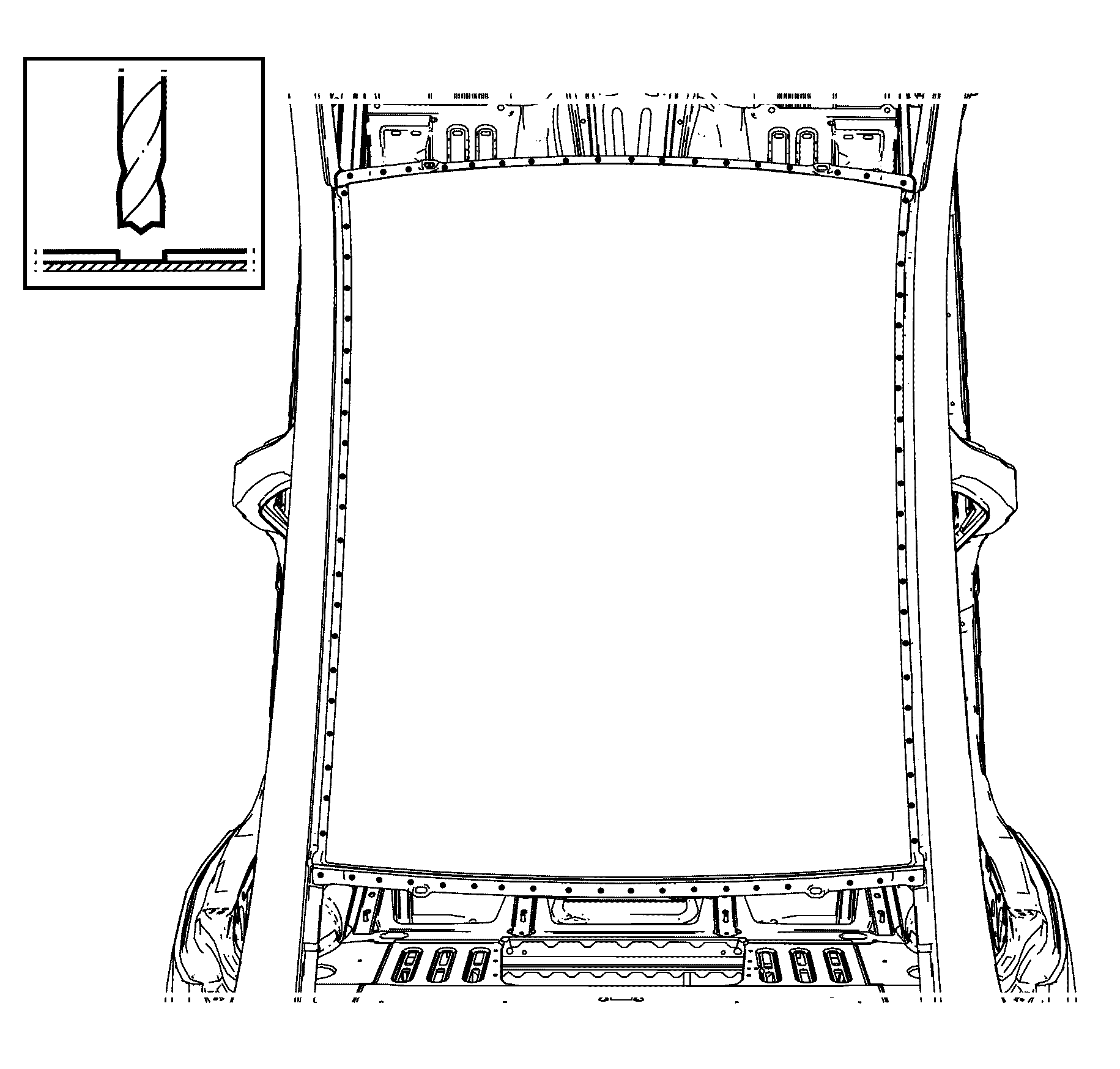
Important: The roof panel is attached to the steel roof structure with beads of adhesive on the sides and spot-welds on the side rail, windshield and back-glass flanges. Replacement of the roof panel can be performed using conventional procedures, however, the windshield and back glass must be removed.
Important: The roof outer panel is secured to the body side panel with adhesive and spot welds, it cannot be removed by cutting the spot welds alone.
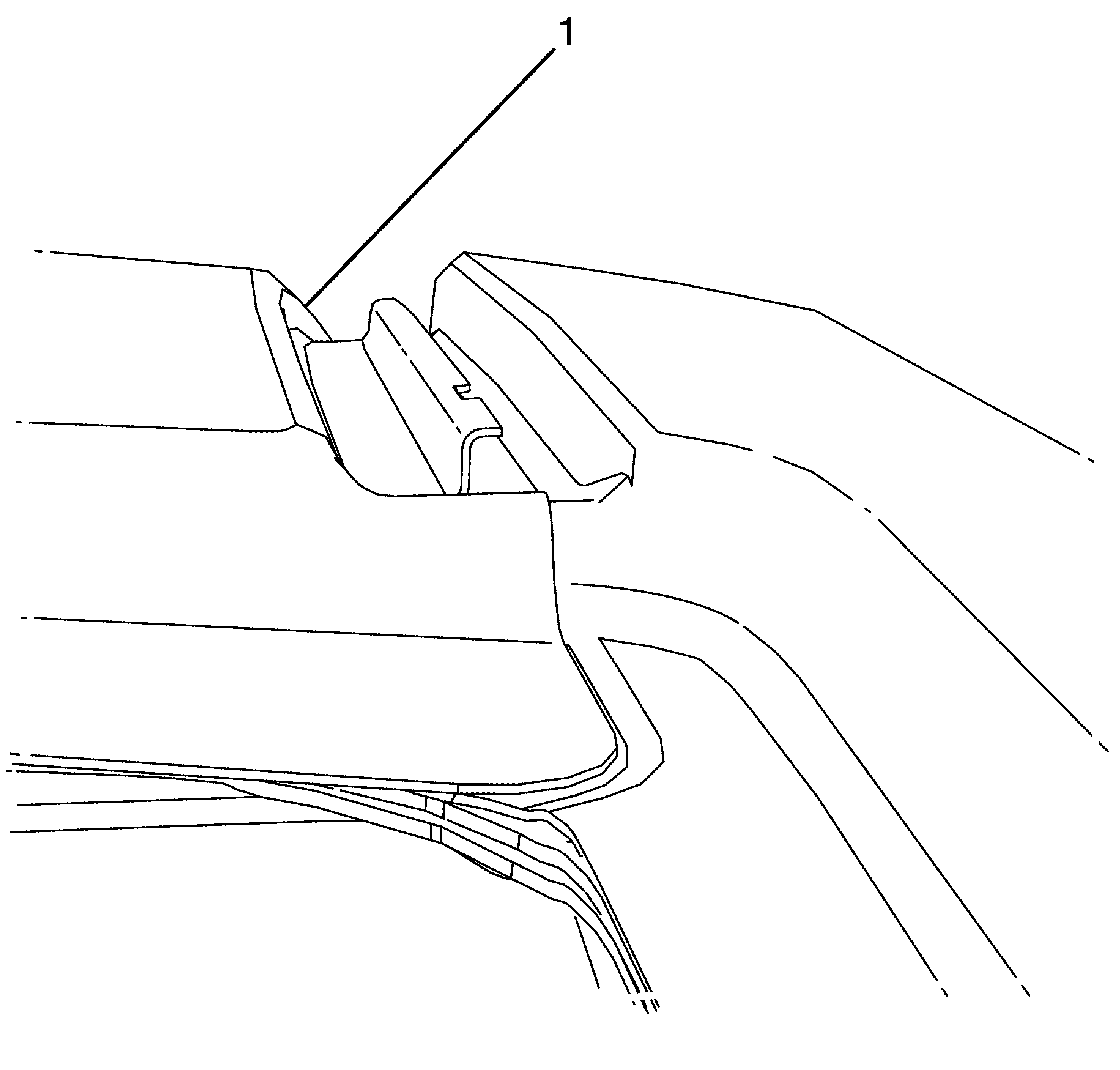
Important: Take care when cutting to protect adjacent panels. Cut inboard of the roof structure.
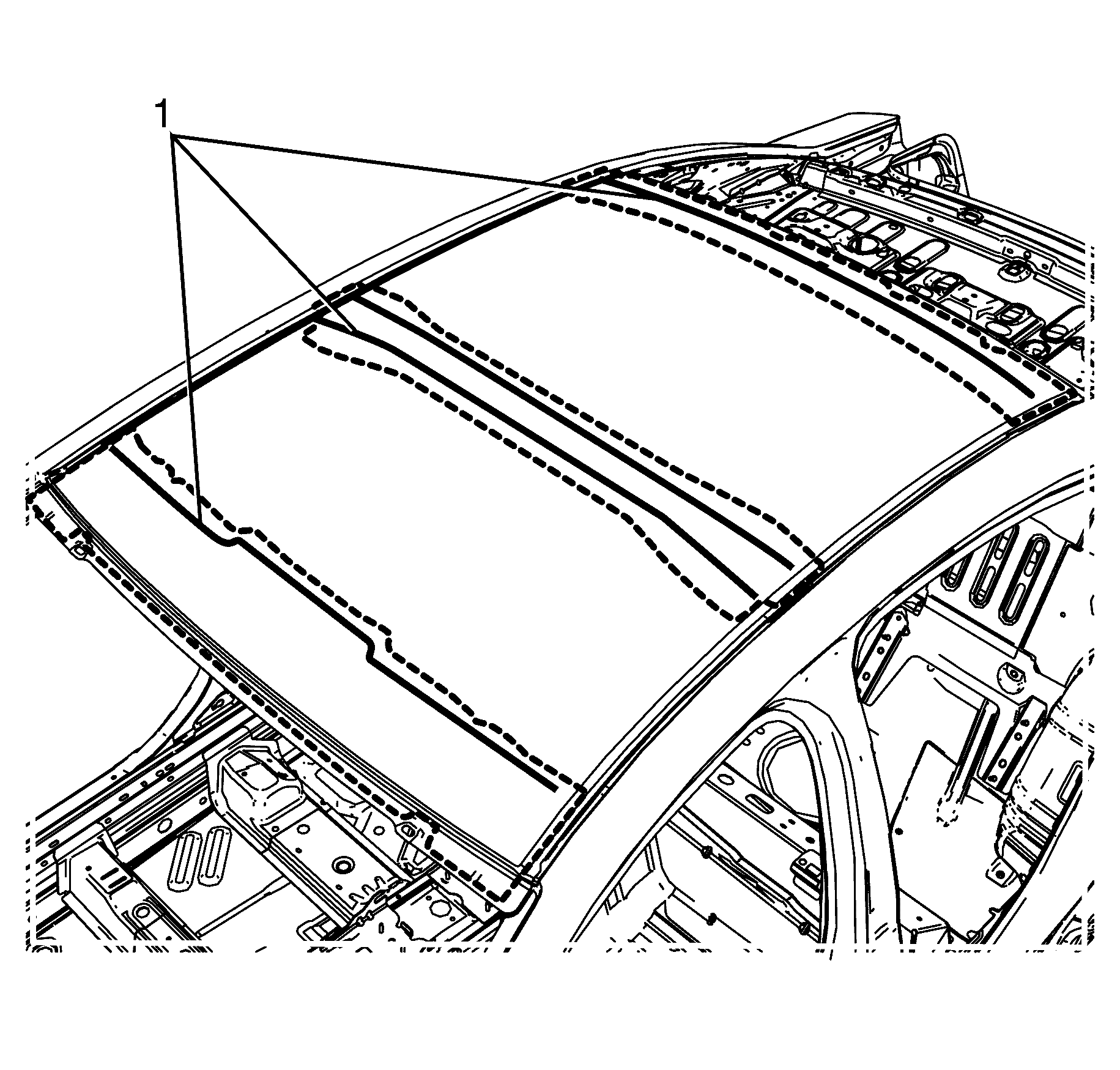
Important: Heating the 'anti-flutter' adhesive softens it making it easier to cut through.
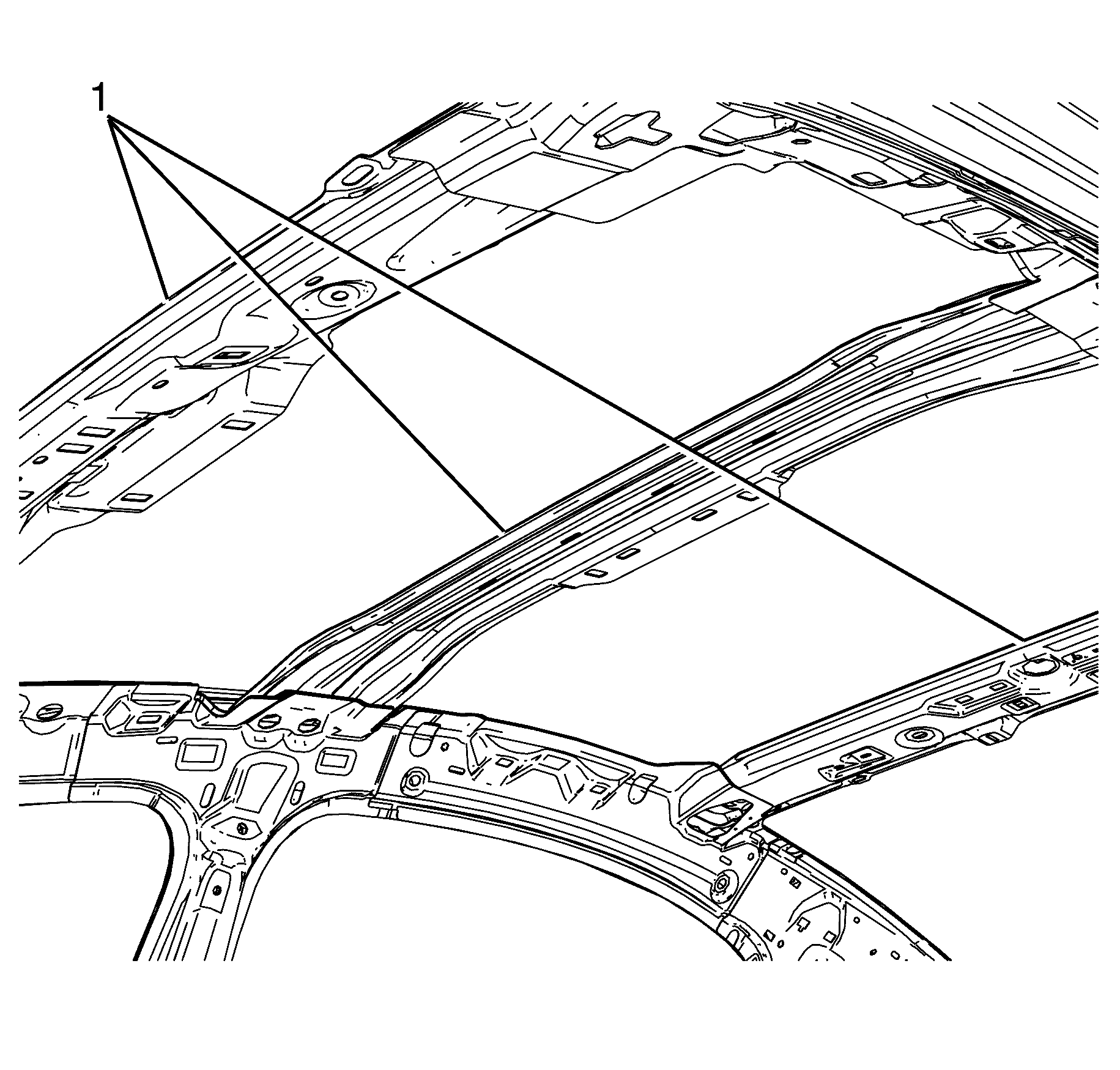
Important: The 'anti-flutter' adhesive (1) is between the roof bows and the roof outer panel.
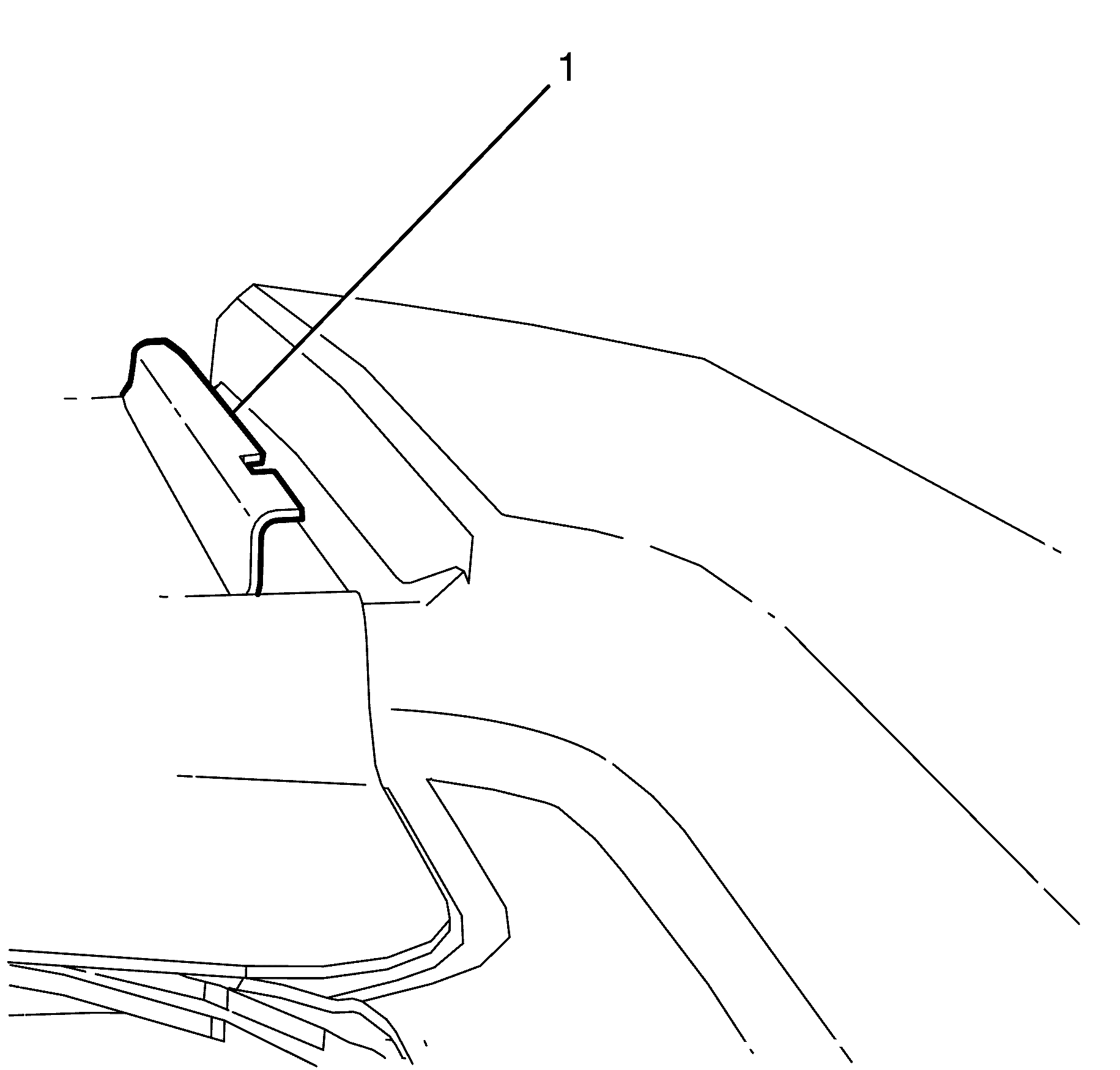
Installation Procedure
- Clean and prepare the attaching surfaces for welding.
- Clean the remaining anti-flutter adhesive from the front, centre and rear bow surfaces.
- Drill 8 mm (5/16 in ) puddle weld holes in the NEW roof outer panel in the locations to be puddle welded.
- Apply two full beads of structural adhesive GM6449G or equivalent to the center bow (2).
- Apply a full bead of structural adhesive GM6449G or equivalent to the front and rear bows (1).
- Apply structural adhesive GM6449G or equivalent to the mating surfaces of the roof panel and body side panel (1).
- Position the NEW roof outer panel to the vehicle.
- Inspect the fit.
- Clamp roof outer panel into correct position.
- Spot weld or puddle weld the roof outer panel on both sides using the same number of welds as per original build.
- Apply the sealers and anti-corrosion materials to the repair area, as necessary. Refer to Anti-Corrosion Treatment and Repair.
- Paint the repaired area. Refer to Basecoat/Clearcoat Paint Systems.
- Install the roof weld moulding. Refer to Roof Weld Joint Reveal Molding Replacement.
- Install the rear window. Refer to Rear Window Replacement.
- Install the windshield. Refer to Windshield Replacement.
- Install the headliner. Refer to Headlining Trim Panel Replacement in Interior Trim.
- Install the overhead lighting panel. Refer to Dome Lamp Replacement.
- Install the inner upper centre trim. Refer to Body Hinge Pillar Trim Panel Replacement.
- Install the inner rear quarter trim. Refer to Quarter Upper Trim Panel Replacement.
- Install the windshield pillar moulding. Refer to Windshield Garnish Molding Replacement.
- Remove the tape to the corners of the panels and adjacent surfaces.
- Connect the negative battery cable. Refer to Battery Negative Cable Disconnection and Connection.
- Enable the SIR system. Refer to SIR Disabling and Enabling in SIR.
- If re-programming is required. Refer to Control Module References.
Important: If the location of the original spot weld holes can not be determined, or if structural weld-thru adhesive is present, space the puddle weld holes every 32 mm (1¼ in).
Important: Spot welding is the preferred method for attaching panels and should be used wherever possible. A puddle weld should be performed where your spot welder is unable to reach.
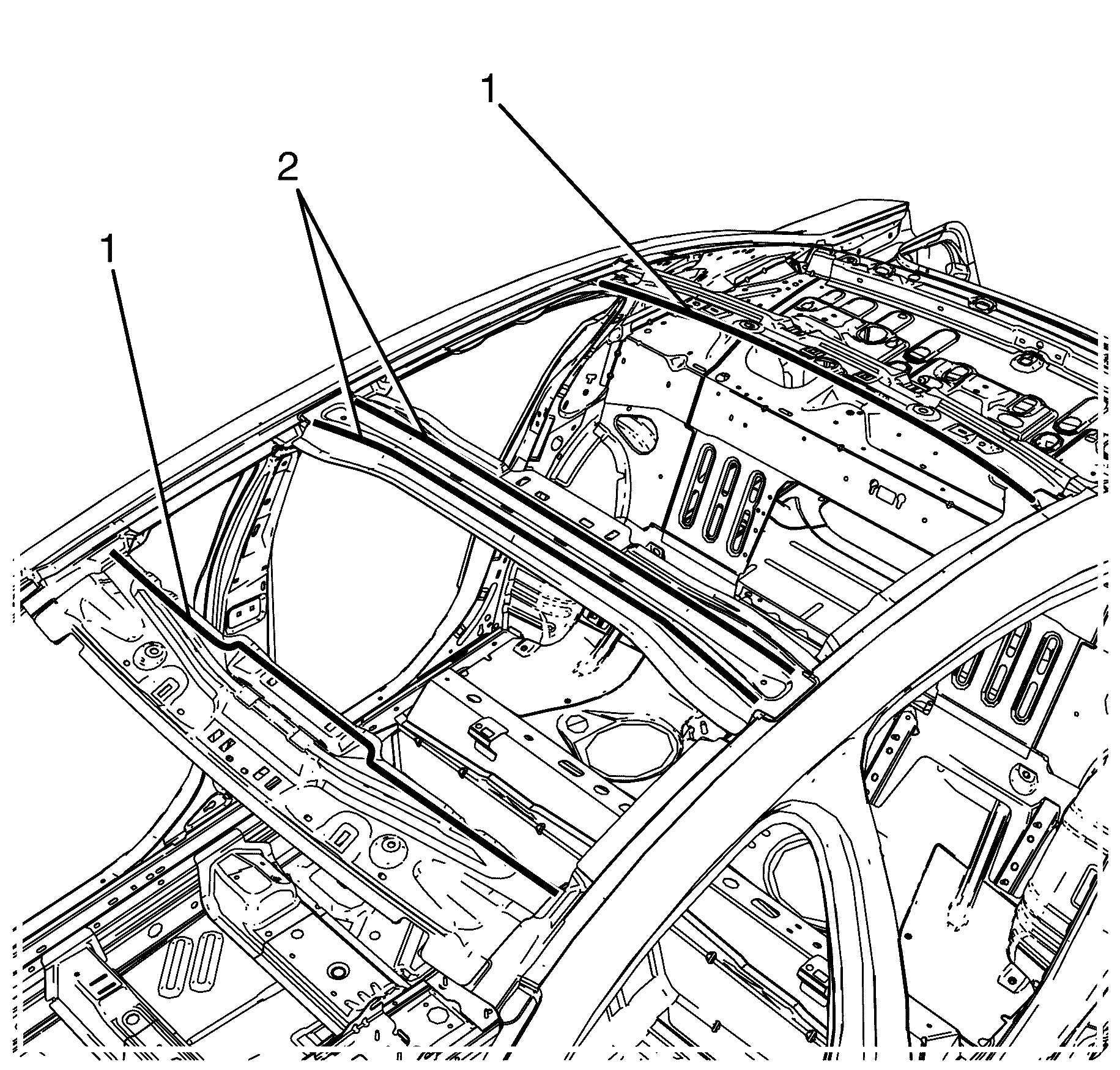
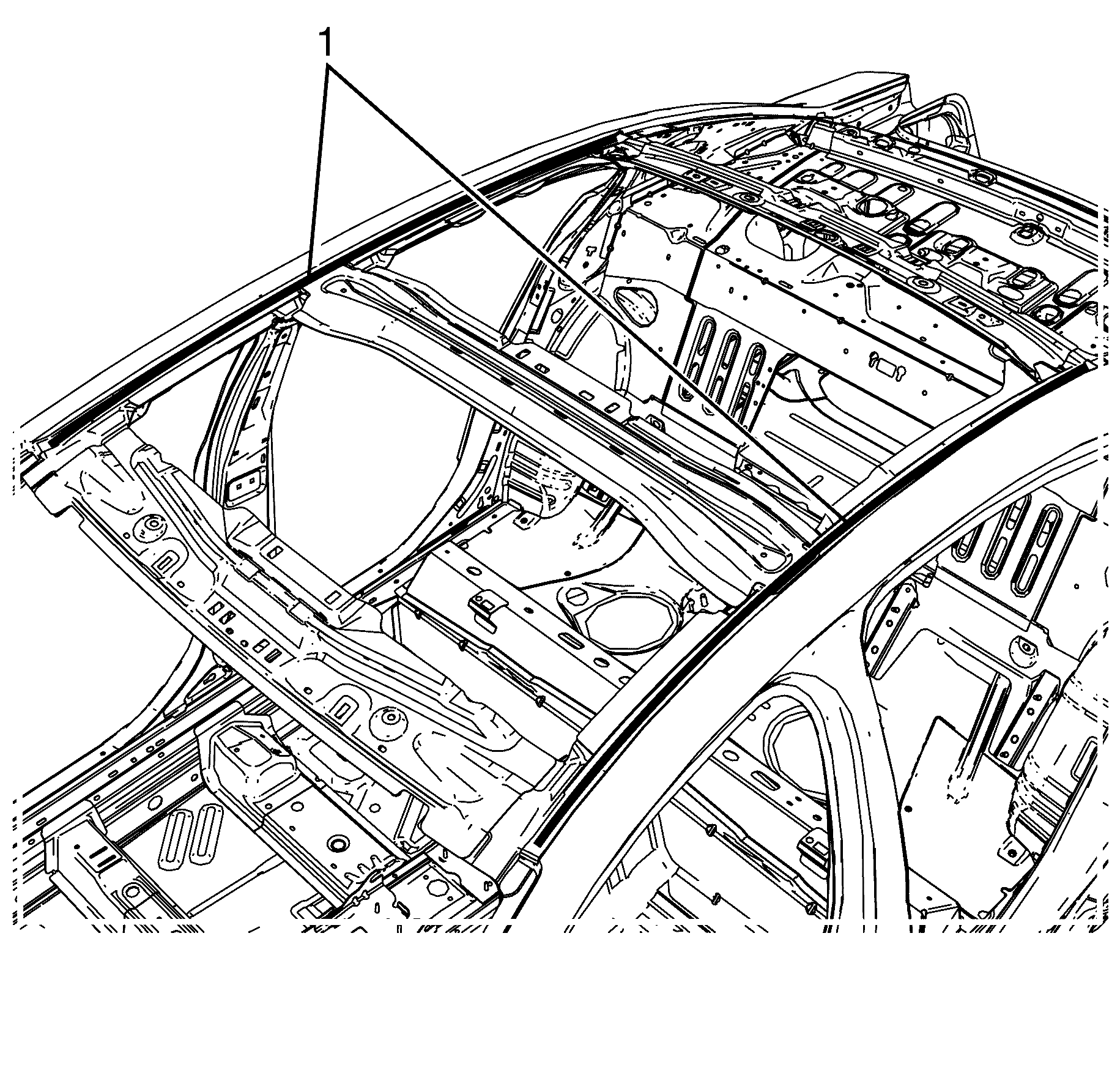
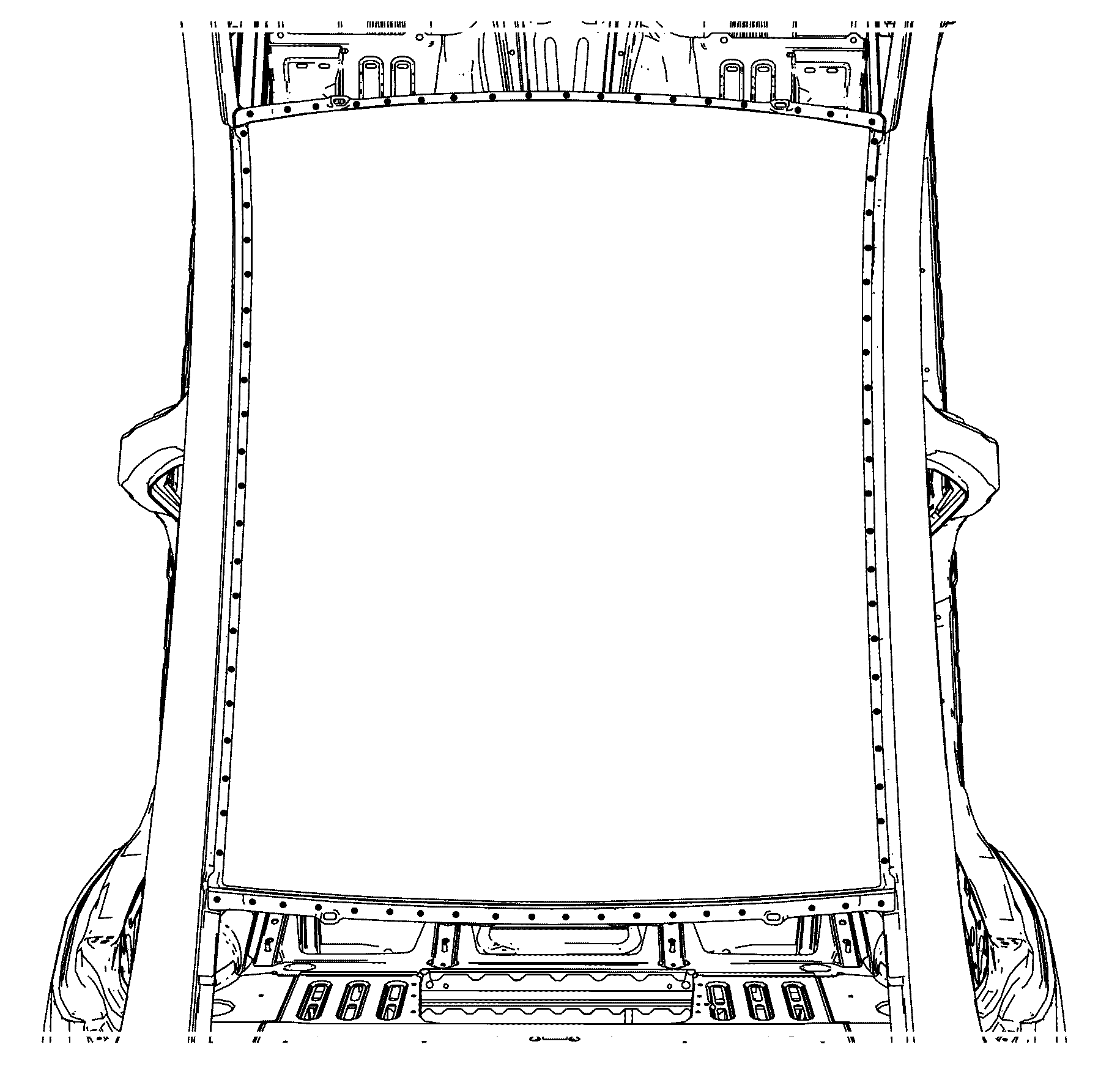
Important: Care must be taken to minimise the heat absorbed by the panel which could lead to panel distortion.
Roof Outer Replacement (With Sunroof) Removal Procedure
- Disable the SIR system. Refer to SIR Disabling and Enabling in SIR.
- Disconnect the negative battery cable. Refer to Battery Negative Cable Disconnection and Connection.
- Apply tape to the corners of the panels and adjacent surfaces.
- Remove the interior windshield garnish moulding. Refer to Windshield Garnish Molding Replacement.
- Remove the inner rear quarter trim. Refer to Quarter Upper Trim Panel Replacement.
- Remove the inner upper centre trim. Refer to Body Hinge Pillar Trim Panel Replacement.
- Remove the over head lighting panel. Refer to Dome Lamp Replacement.
- Remove the headliner. Refer to Headlining Trim Panel Replacement in Interior Trim.
- Remove the windshield. Refer to Windshield Replacement.
- Remove the rear window. Refer to Rear Window Replacement.
- Remove the roof weld moulding. Refer to Roof Weld Joint Reveal Molding Replacement.
- Remove the sunroof module. Refer to Sunroof Module Assembly Replacement.
- Remove the front sunroof drain hose. Refer to Sunroof Housing Front Drain Hose Replacement.
- Remove the rear sunroof drain hose. Refer to Sunroof Housing Rear Drain Hose Replacement.
- Visually inspect the damage. Repair as much of the damage as possible.
- Remove the sealers and anti-corrosion materials from the repair area, as necessary. Refer to Anti-Corrosion Treatment and Repair.
- Locate and mark all factory welds.
- Drill all factory welds. Note the number and location of welds for installation of the service assembly.
- Using a suitable tool, cut through the roof outer panel along the side of the roof channel (1).
- Heat the 'anti-flutter' adhesive between the roof panel and the rear roof bow (1).
- Locate, mark, and drill out the factory welds (1) attaching the roof panel assembly to the body side rings.
- Remove the roof outer panel assembly from the vehicle.
- Using a suitable tool remove the remaining strip of roof panel (1) from the body side panel.
Caution: Refer to Approved Equipment for Collision Repair Caution in the Preface section.
Caution: Refer to Foam Sound Deadeners Caution in the Preface section.
Caution: Refer to Battery Disconnect Caution in the Preface section.
Important: Use care when cutting to protect adjacent panels. Cut inboard of the roof structure.
Important: The roof panel is attached to the steel roof structure with beads of adhesive on the sides and spot-welds on the side rail, windshield and back-glass flanges. Replacement of the roof panel can be performed using conventional procedures, however, the windshield and back glass must be removed.
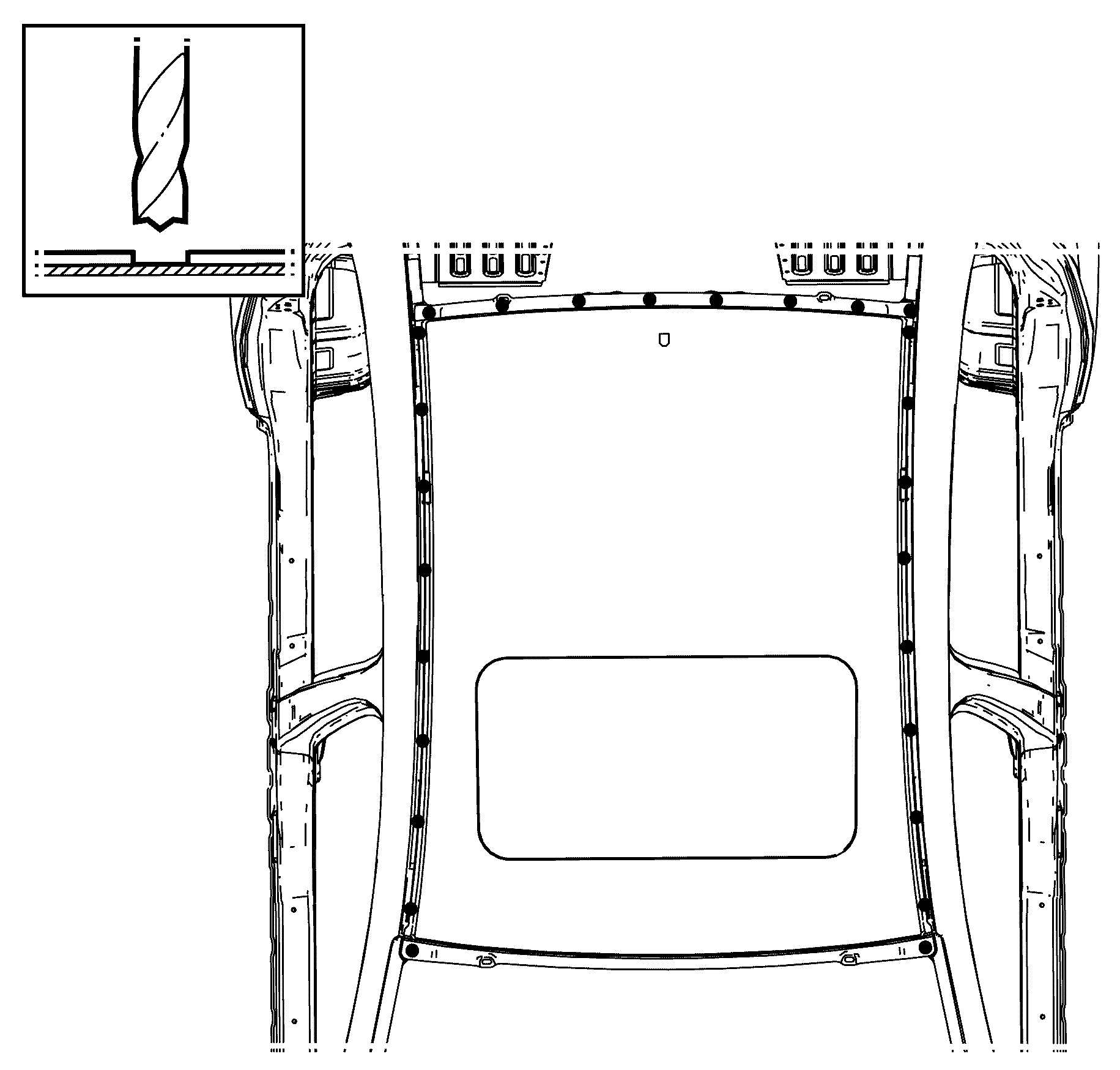
Important: The roof outer panel is secured to the body side panel with adhesive and spot welds, it cannot be removed by cutting the spot welds alone.

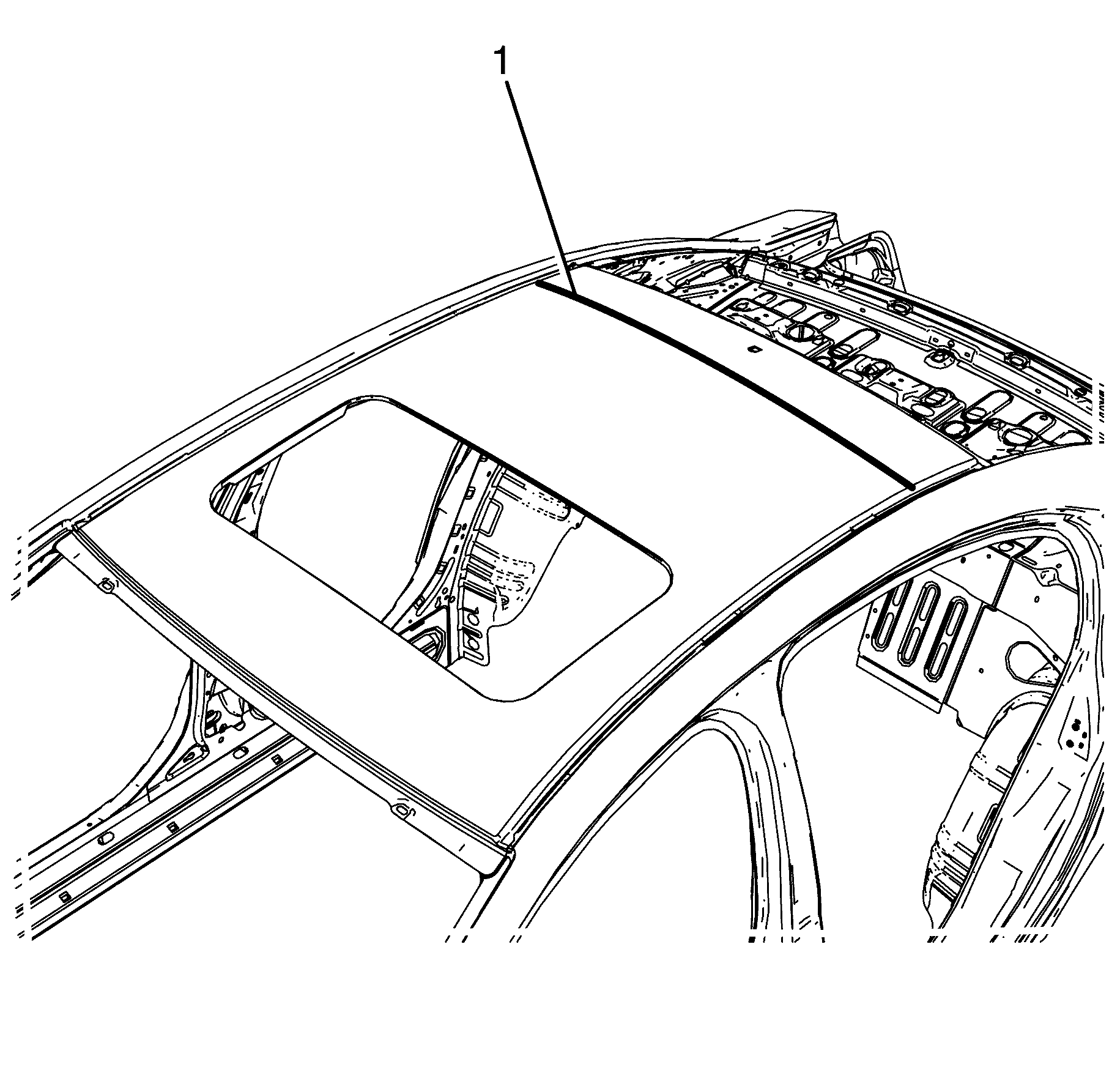
Important: Heating the 'anti-flutter' adhesive softens it making it easier to cut through.
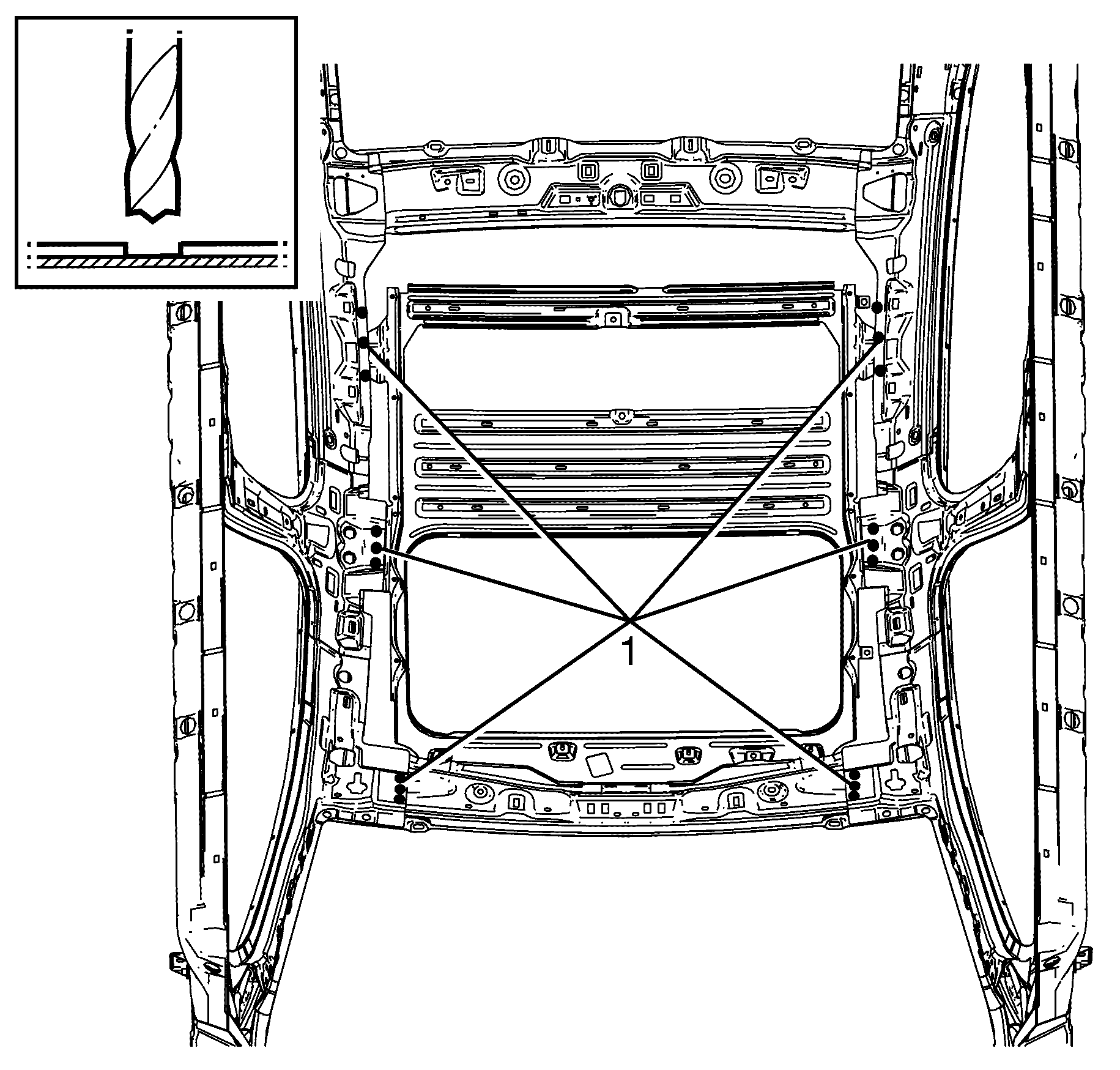

Roof Outer Replacement (With Sunroof) Installation Procedure
- Clean and prepare the attaching surfaces for welding.
- Clean the remaining anti-flutter adhesive from the front, centre and rear bow surfaces.
- Mark the NEW roof outer panel with drilling locations, where puddle welding is necessary.
- Drill 8 millimetres (5/16 in ) puddle weld holes in the NEW roof outer panel in the locations to be puddle welded.
- Apply a full bead of structural adhesive GM6449G or equivalent to the rear roof bow (1).
- Apply structural adhesive GM6449G or equivalent to the mating surfaces of the roof panel and body side rings (1).
- Position the NEW roof outer panel assembly to the vehicle.
- Inspect for proper fitment.
- Clamp roof outer panel into correct position.
- Spot weld or puddle weld the roof outer panel on both sides using the same number of welds as per original build.
- Apply the sealers and anti-corrosion materials to the repair area, as necessary. Refer to Anti-Corrosion Treatment and Repair.
- Paint the repaired area. Refer to Basecoat/Clearcoat Paint Systems.
- Install the upper rear sunroof drain hose. Refer to Sunroof Housing Rear Drain Hose Replacement.
- Install the front sunroof drain hose. Refer to Sunroof Housing Front Drain Hose Replacement.
- Install the sunroof module. Refer to Sunroof Module Assembly Replacement.
- If re-programming is required. Refer to Control Module References.
- Install the roof weld moulding. Refer to Roof Weld Joint Reveal Molding Replacement.
- Install the rear window. Refer to Rear Window Replacement.
- Install the windshield. Refer to Windshield Replacement.
- Install the headliner. Refer to Headlining Trim Panel Replacement in Interior Trim.
- Install the over head lighting panel. Refer to Dome Lamp Replacement.
- Install the inner upper centre trim. Refer to Body Hinge Pillar Trim Panel Replacement.
- Install the inner rear quarter trim. Refer to Quarter Upper Trim Panel Replacement.
- Install the interior windshield pillar moulding. Refer to Windshield Garnish Molding Replacement.
- Remove the tape to the corners of the panels and adjacent surfaces.
- Connect the negative battery cable. Refer to Battery Negative Cable Disconnection and Connection.
- Enable the SIR system. Refer to SIR Disabling and Enabling in SIR.
- If re-programming is required. Refer to Control Module References.
Important: If the location of the original spot weld holes can not be determined, or if structural weld-thru adhesive is present, space the puddle weld holes every 32 millimetres (1¼ in).
Important: Spot welding is the preferred method for attaching panels and should be used wherever possible. A puddle weld should be performed where your spot welder is unable to reach.
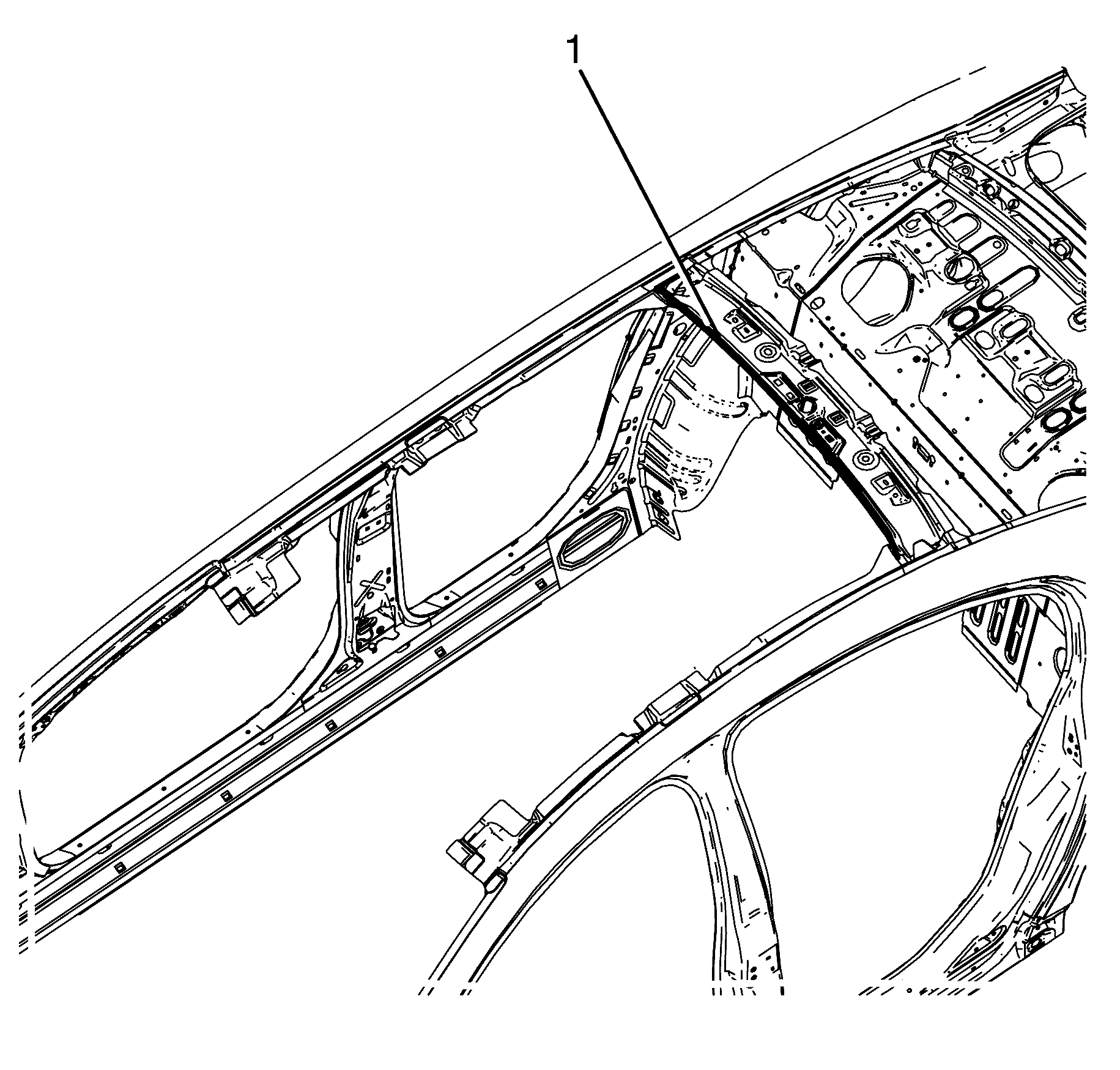
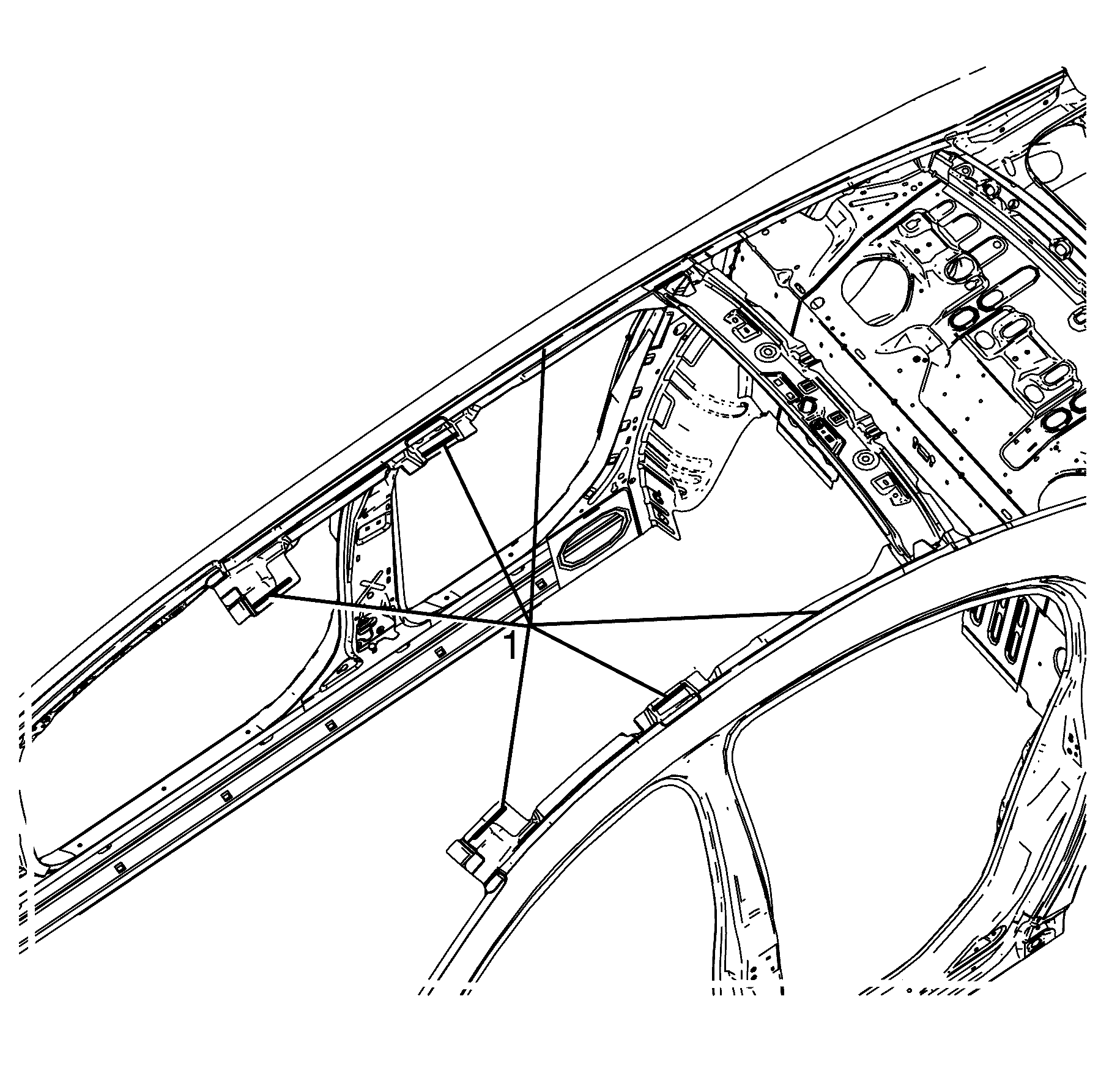
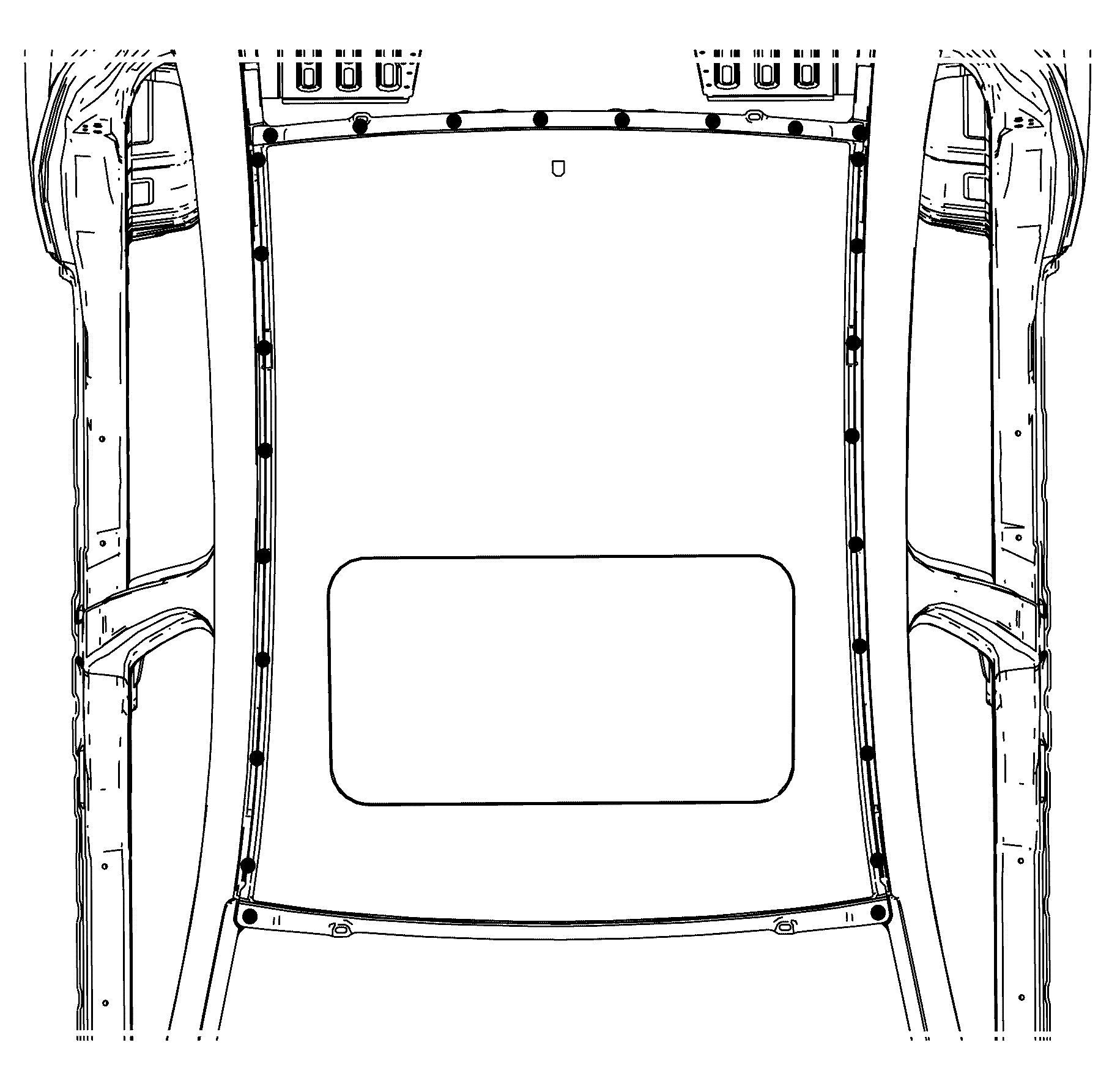
Important: Care must be taken to minimise the heat absorbed by the panel which could lead to panel distortion.
Roof Panel Replacement Sportwagon
Removal Procedure
- Disable the SIR system. Refer to SIR Disabling and Enabling.
- Disconnect the negative battery cable. Refer to Battery Negative Cable Disconnection and Connection.
- Remove the front seats. Refer to Front Seat Replacement - Bucket.
- Remove the front seat belts. Refer to Front Seat Belt Replacement.
- Remove the rear end trim finish panel. Refer to Rear End Trim Finish Panel Replacement.
- Remove the rear compartment floor panel carpet. Refer to Rear Compartment Floor Panel Carpet Replacement.
- Remove the load floor stationary panel carpet. Refer to Load Floor Stationary Panel Carpet Replacement.
- Remove the load floor front panel carpet. Refer to Load Floor Front Panel Carpet Replacement.
- Remove the liftgate weatherstrip. Refer to Liftgate Weatherstrip Replacement.
- Remove the quarter inner trim finish panel. Refer to Quarter Inner Trim Finish Panel Replacement.
- Remove the headlining rear trim panel retainer. Refer to Headlining Rear Trim Panel Retainer Replacement.
- Remove the body side window rear garnish moulding. Refer to Body Side Window Rear Garnish Molding Replacement.
- Remove the rear seat cushion. Refer to Rear Seat Cushion Replacement.
- Remove the rear seat back. Refer to Rear Split Folding Seat Back Replacement.
- Remove the headliner. Refer to Headlining Trim Panel Replacement.
- Remove the roof weld joint reveal moulding. Refer to Roof Weld Joint Reveal Molding Replacement.
- Remove the windshield pillar garnish moulding. Refer to Windshield Pillar Garnish Molding Replacement.
- Remove the windshield. Refer to Windshield Replacement.
- Remove the liftgate. Refer to Liftgate Replacement.
- Remove the liftgate hinges. Refer to Liftgate Hinge Replacement.
- Remove the liftgate weatherstrip. Refer to Liftgate Weatherstrip Replacement.
- Remove the body side roof drip moulding. Refer to Body Side Roof Drip Molding Replacement.
- Visually inspect the damage. Repair as much of the damage as possible.
- Apply tape to the corners of the panels and adjacent surfaces.
- Note the location and remove the sealers and anti-corrosion materials from the repair area, as necessary. Refer to Anti-Corrosion Treatment and Repair.
- Remove the sealer patches (1) from the joint between the roof panel and the gutter panel. Note the location of sealer patches for later installation.
- Locate, mark and drill out the factory welds attaching the roof outer panel to the vehicle (1). Note the number and location of welds for installation of the service assembly.
- Locate, mark and drill out the factory welds attaching the roof outer panel to the roof rear header (1). Note the number and location of the welds for the installation of the service assembly.
- Using a suitable tool, cut through the roof outer panel along the inner side of the roof channel (1). Repeat for opposite side.
- Heat the 'anti-flutter' adhesive between the roof panel and the roof bows (1).
- Cut the 'anti-flutter' adhesive (1) with a suitable tool.
- Remove the roof outer panel from the vehicle.
- Using a suitable tool remove the remaining strip of roof panel (1) from the body side ring. repeat for opposite side.
- Mark a cut line (1) on the centre roof bow panel (2) inboard of the body side.
- Cut along the cut line (1) on the centre roof bow panel (2) with a suitable cutting tool.
- Remove the centre portion of the centre roof bow panel (2) from the vehicle.
- Using a suitable tool, remove the remaining outer portions of the centre roof bow panel from the vehicle. Ensure all traces of old adhesive are removed.
Caution: Refer to Approved Equipment for Collision Repair Caution in the Preface section.
Caution: Refer to Safety Glasses Caution in the Preface section.
Caution: Refer to Foam Sound Deadeners Caution in the Preface section.
Caution: Refer to Battery Disconnect Caution in the Preface section.
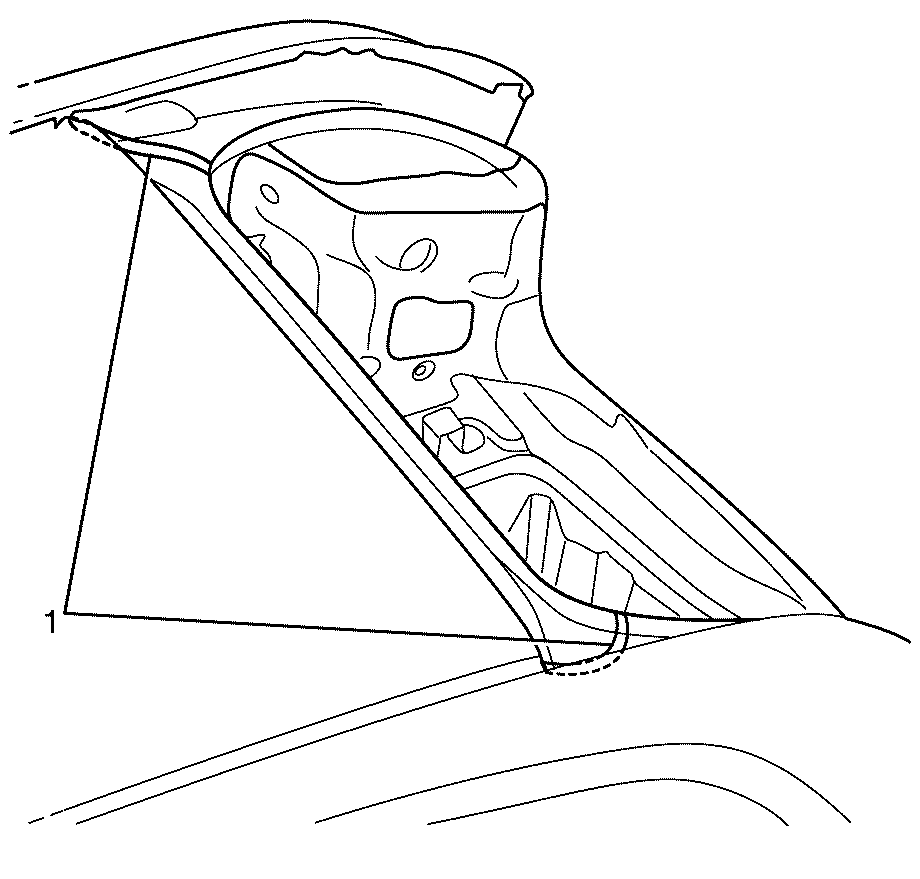
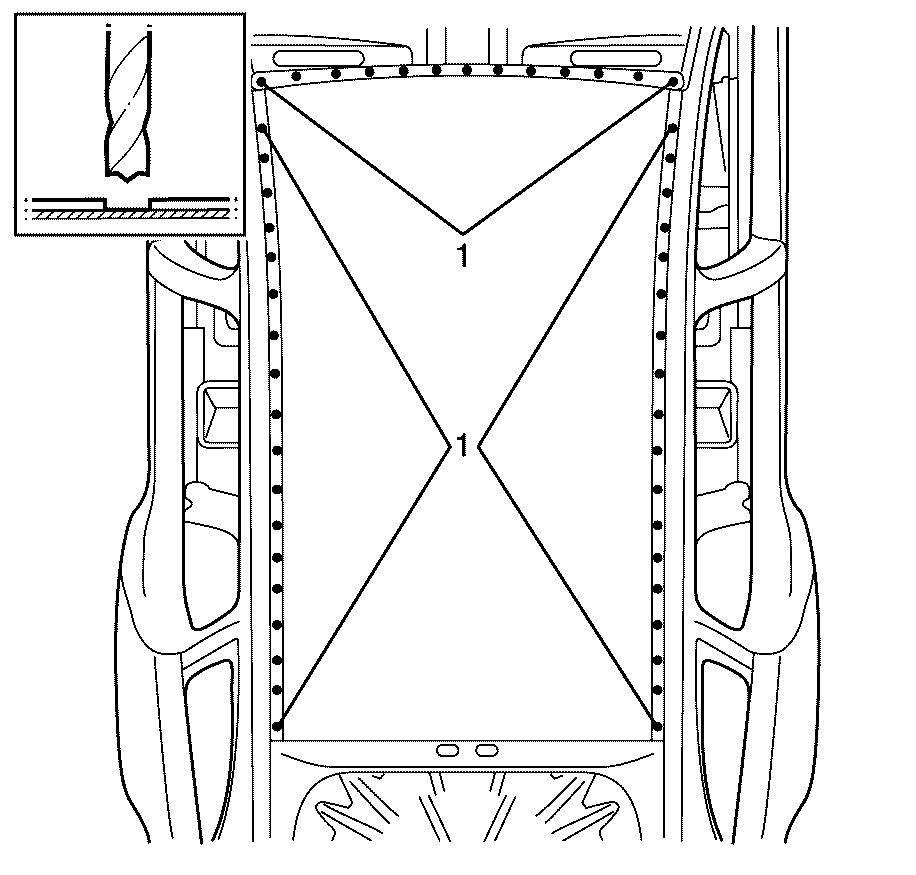
Important: The roof panel is attached to the steel roof structure with beads of adhesive on the sides and spot-welds on the side rail, windshield flange and rear roof header panel. Replacement of the roof panel can be performed using conventional procedures, however, the windshield and liftgate must be removed.
Important: The roof outer panel is secured to the body side panel with adhesive and spot welds, it cannot be removed by cutting the spot welds alone.
Important: Note the number and location of the factory welds for installation of the new roof outer panel assembly.
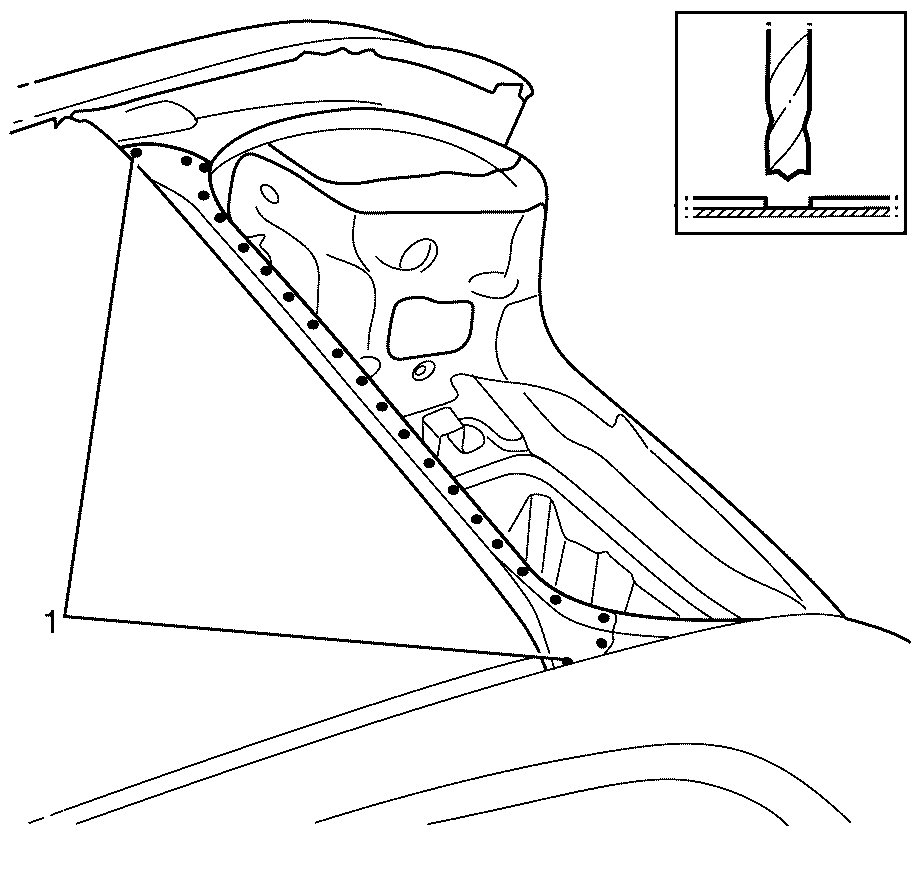
Important: Note the number and location of the factory welds for installation of the new roof outer panel assembly.

Important: Take care when cutting to protect adjacent panels. Cut inboard of the roof structure.
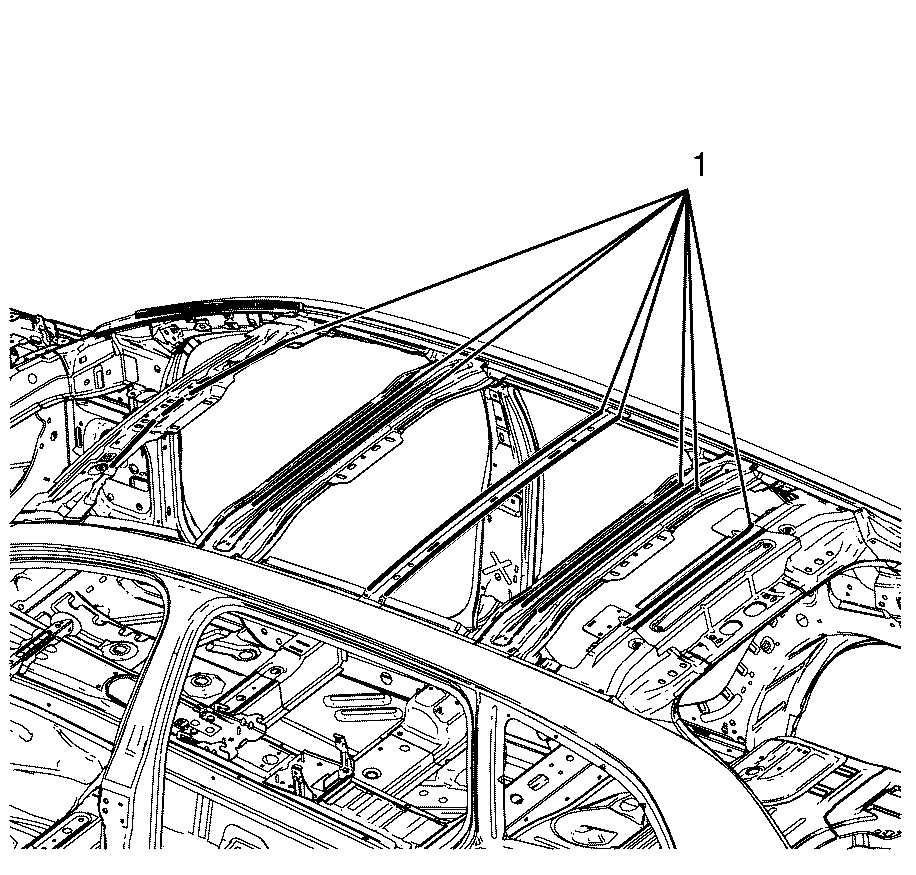
Important: Heating the 'anti-flutter' adhesive softens it making it easier to cut through.
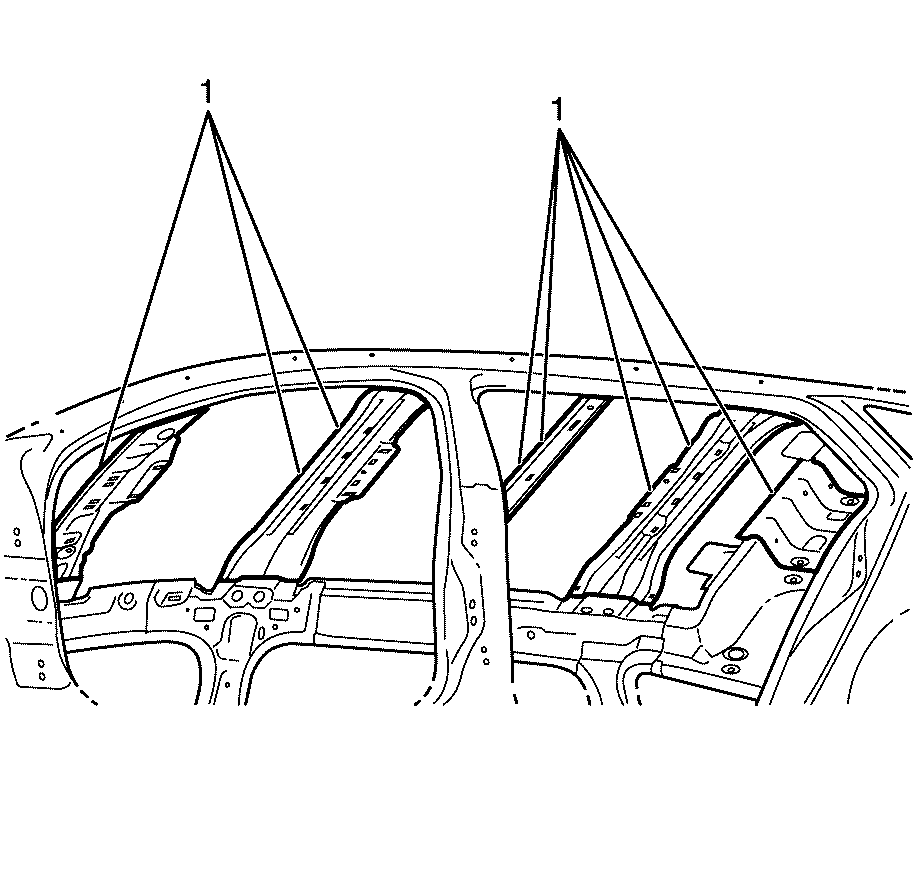
Important: The 'anti-flutter' adhesive (1) is between the roof bows and the roof outer panel.

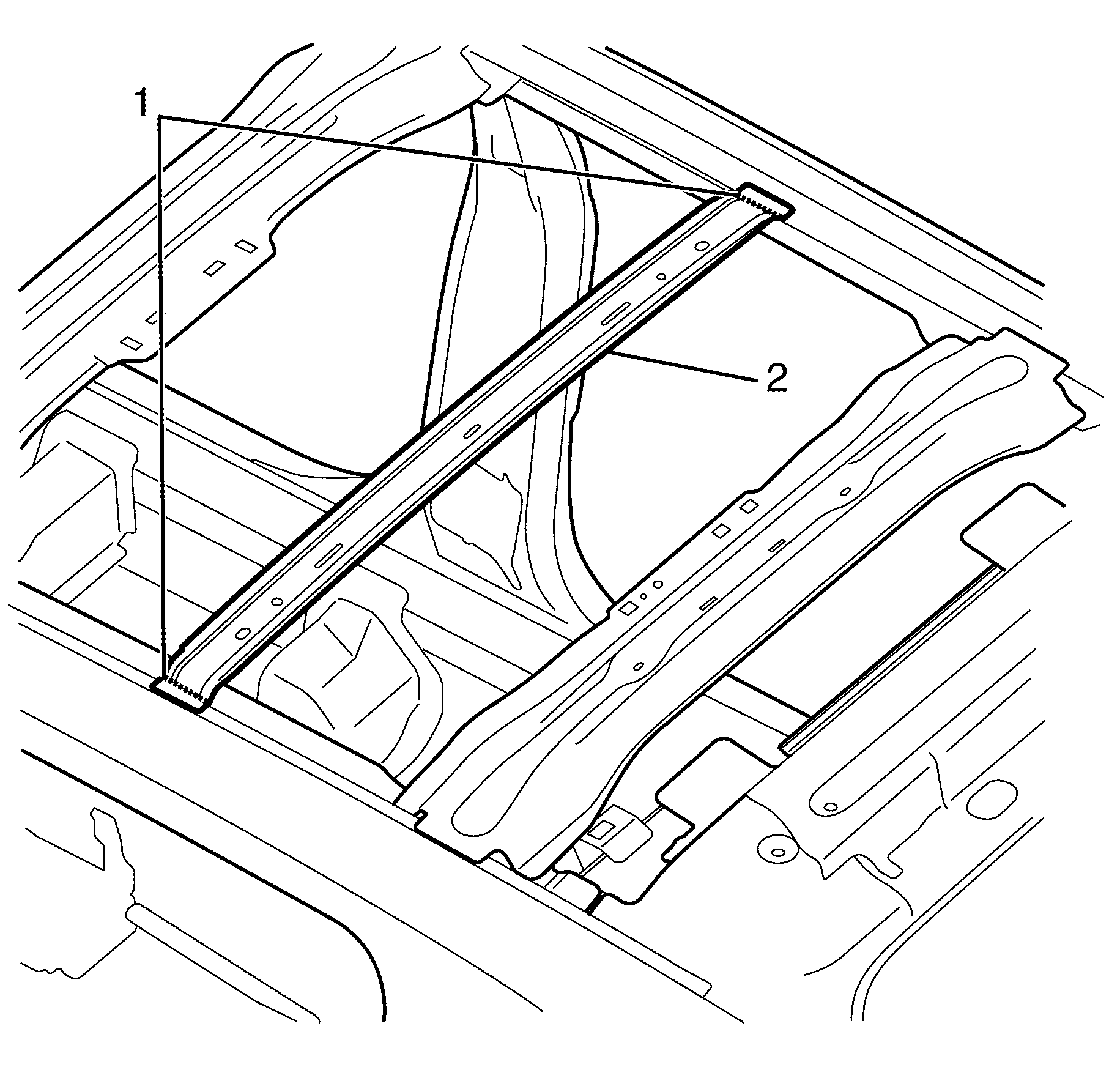
Important: The centre roof bow panel is supplied welded to the roof outer panel. The centre roof bow panel is removed in this procedure as it will be replaced when the new roof outer panel is installed.
Important: Cut through the centre roof bow panel only. Do not damage any other panels or reinforcements.
Installation Procedure
- Drill 8 mm (5/16 in) plug weld holes as necessary in the locations noted when disassembling.
- Clean and prepare the mating surfaces of both parts of the body side panel assembly.
- Clean any remaining anti-flutter adhesive from the front, centre and rear roof bow and front/rear roof header surfaces.
- Drill 8 mm (5/16 in ) puddle weld holes in the NEW roof outer panel in the locations to be puddle welded.
- Apply two full beads (6mm dia) of approved anti-flutter adhesive to each of the roof bow panels (1).
- Apply a full bead (6mm dia) of approved anti-flutter adhesive to the roof front and rear header panel (1).
- Apply an 8mm wide bead of structural adhesive (GM6449G or equivalent) to the mating surfaces of the Roof Outer Panel and Body Side Panel (1).
- Position the NEW roof outer panel to the vehicle. Inspect the fit and clamp roof outer panel into correct position.
- Weld the roof outer panel on to both sides and to the front roof header panel of the vehicle (1).
- Weld the roof outer panel on to the rear roof header panel of the vehicle (1).
- Apply secondary sealer (GM specification 9984532 or equivalent) (1) over the joint between the roof panel and gutter panel.
- Apply the sealers and anti-corrosion materials to the repair area, as necessary. Refer to Anti-Corrosion Treatment and Repair.
- Paint the repaired area. Refer to Basecoat/Clearcoat Paint Systems.
- Install the body side roof drip moulding. Refer to Body Side Roof Drip Molding Replacement.
- Install the liftgate hinges. Refer to Liftgate Hinge Replacement.
- Install the liftgate. Refer to Liftgate Replacement.
- Install the windshield. Refer to Windshield Replacement.
- Install the windshield pillar garnish moulding. Refer to Windshield Pillar Garnish Molding Replacement.
- Install the roof weld joint reveal moulding. Refer to Roof Weld Joint Reveal Molding Replacement.
- Install the headliner. Refer to Headlining Trim Panel Replacement.
- Install the rear seat back. Refer to Rear Split Folding Seat Back Replacement.
- Install the rear seat cushion. Refer to Rear Seat Cushion Replacement.
- Install the body side window rear garnish moulding. Refer to Body Side Window Rear Garnish Molding Replacement.
- Install the headlining rear trim panel retainer. Refer to Headlining Rear Trim Panel Retainer Replacement.
- Install the quarter inner trim finish panel. Refer to Quarter Inner Trim Finish Panel Replacement.
- Install the liftgate weatherstrip. Refer to Liftgate Weatherstrip Replacement.
- Install the load floor front panel carpet. Refer to Load Floor Front Panel Carpet Replacement.
- Install the load floor stationary panel carpet. Refer to Load Floor Stationary Panel Carpet Replacement.
- Install the rear compartment floor panel carpet. Refer to Rear Compartment Floor Panel Carpet Replacement.
- Install the rear end trim finish panel. Refer to Rear End Trim Finish Panel Replacement.
- Install the front seat belts. Refer to Front Seat Belt Replacement.
- Install the front seats. Refer to Front Seat Replacement - Bucket.
- Connect the negative battery cable. Refer to Battery Negative Cable Disconnection and Connection.
- Enable the SIR system. Refer to SIR Disabling and Enabling.
Important: Spot welding is the preferred method for attaching panels and should be used wherever possible. A puddle weld should be performed where your spot welder is unable to reach.
Important: Ensure that all factory welds are replaced in their original locations.
Important: Ensure that all structural adhesives are replaced in their original locations.
Important: If the location of the original spot weld holes can not be determined, or if structural weld-thru adhesive is present, space the puddle weld holes every 32 mm (1¼ in).
Important: Follow the adhesive manufacturer's instructions during the assembly process. Heat must be applied as per the manufacturer's specifications to cure the adhesives and to expand the sealing baffles.
Important: Secondary sealer must be applied to the perimeter of all flanges. Secondary sealer must be applied to all welds/joints that were originally covered by secondary sealer.
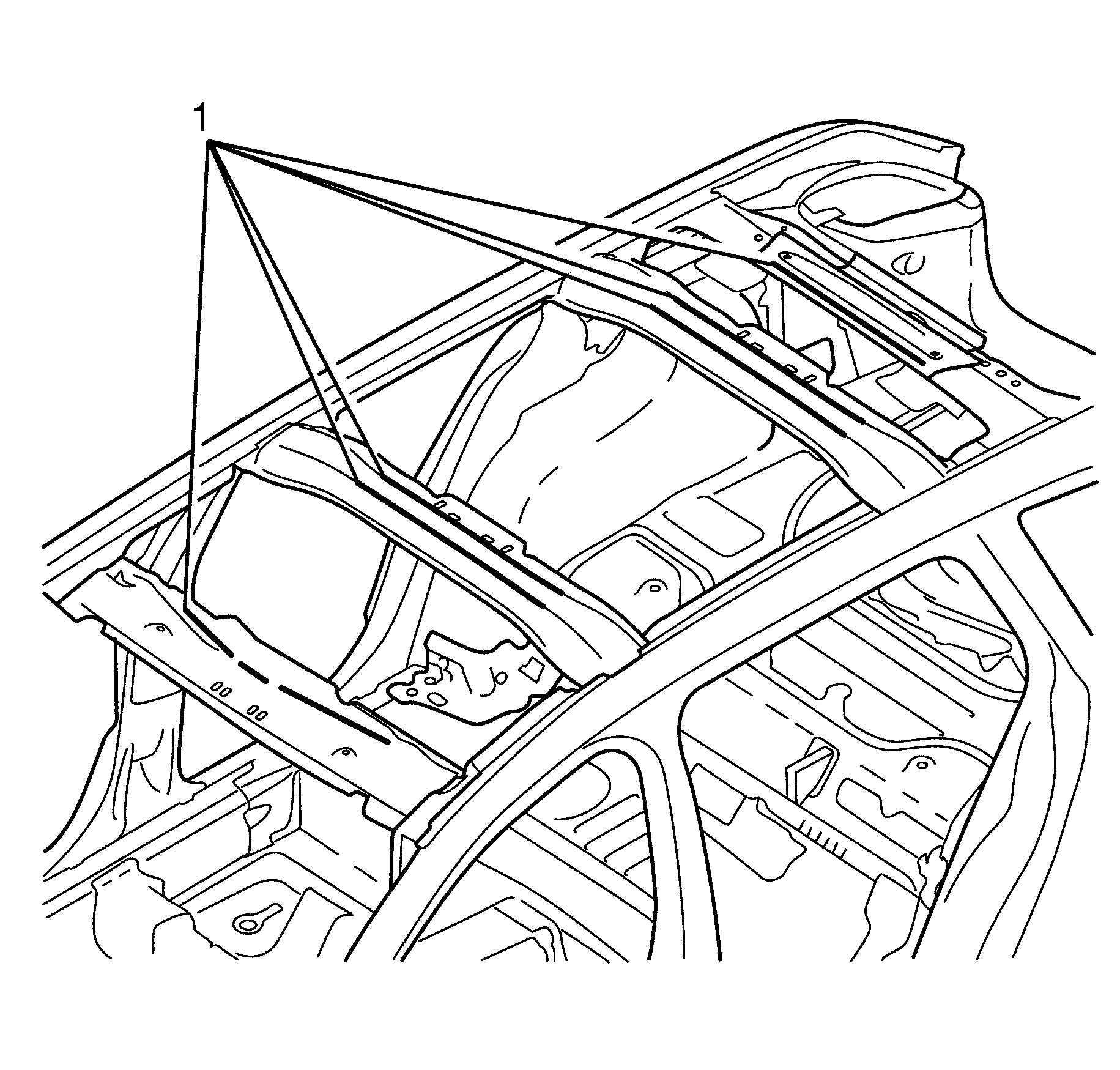
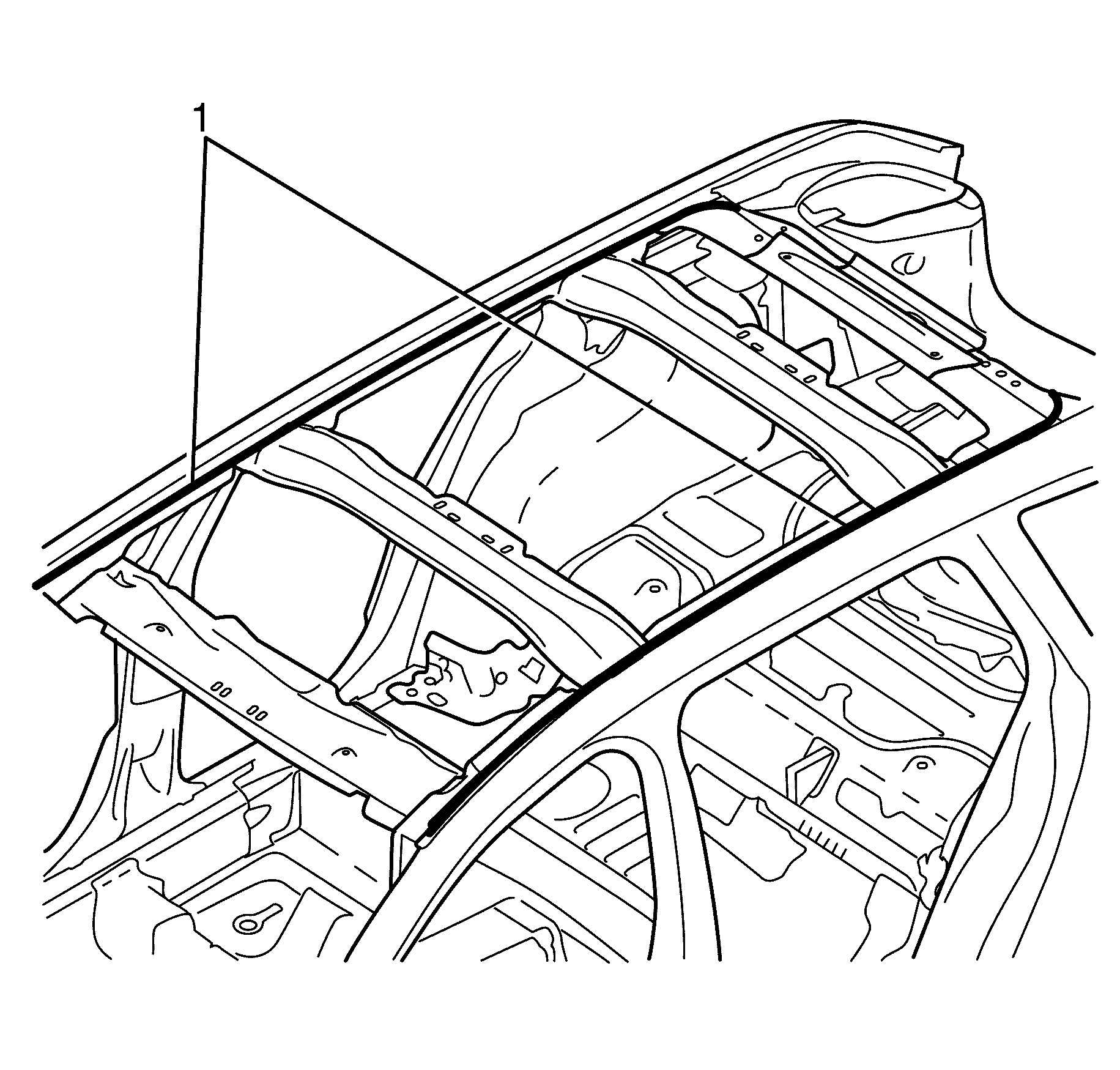
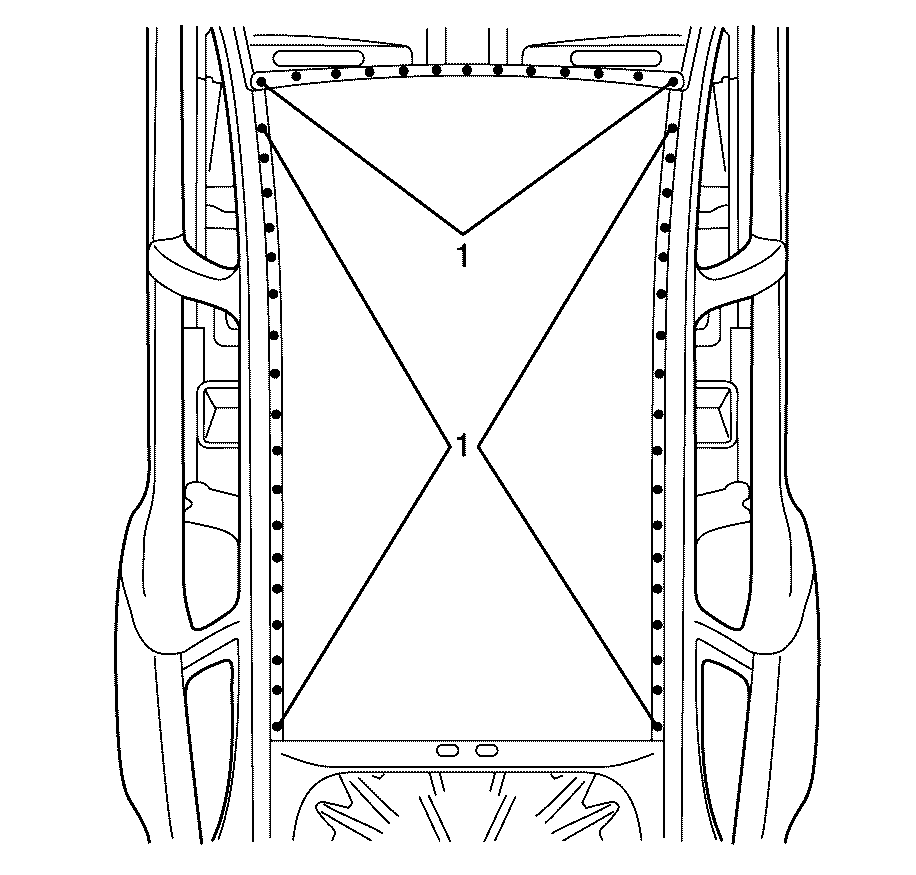
Important: Care must be taken to minimise the heat absorbed by the panel which could lead to panel distortion.
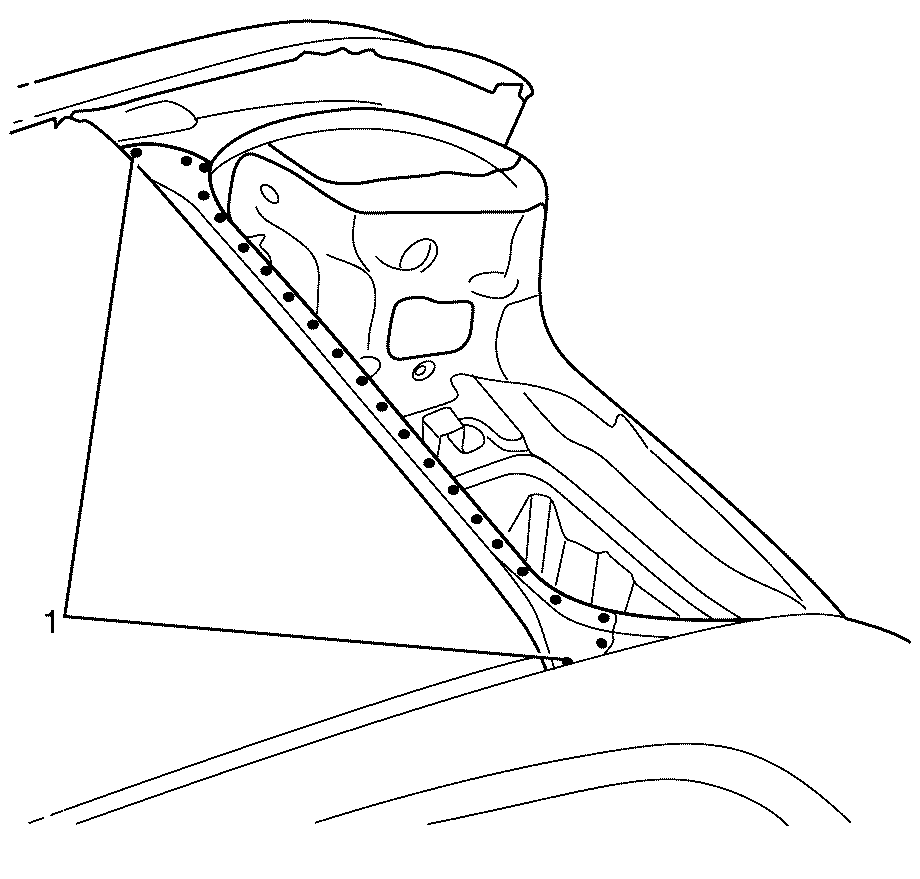
Important: Care must be taken to minimise the heat absorbed by the panel which could lead to panel distortion.

